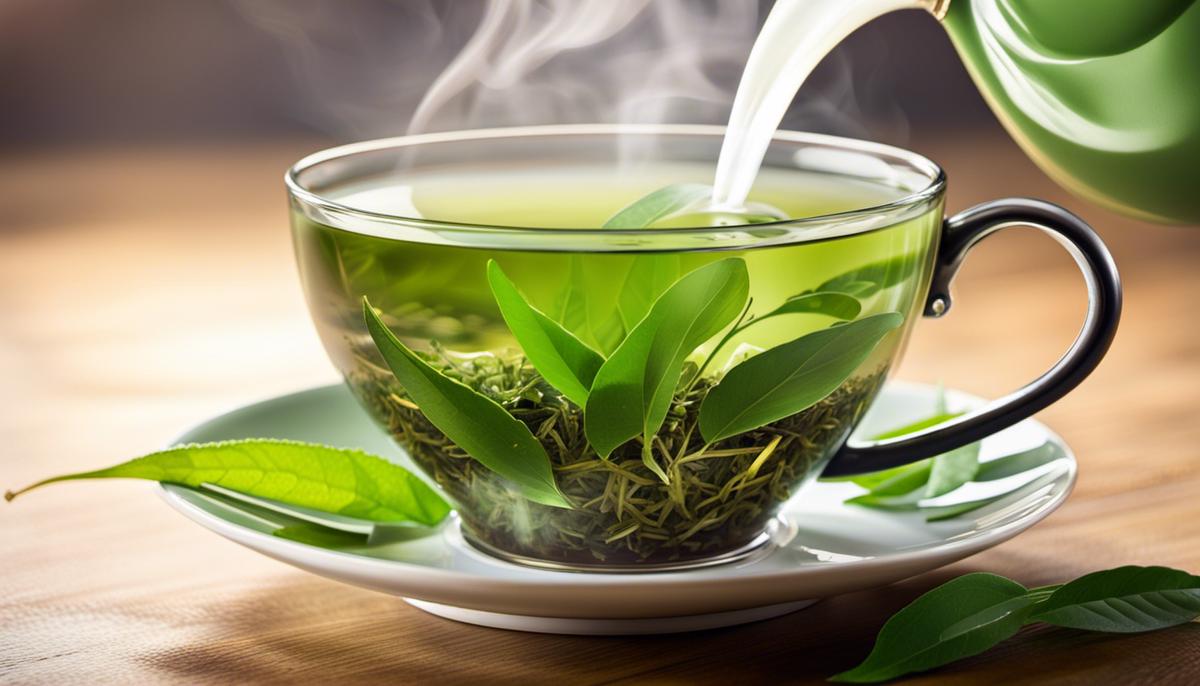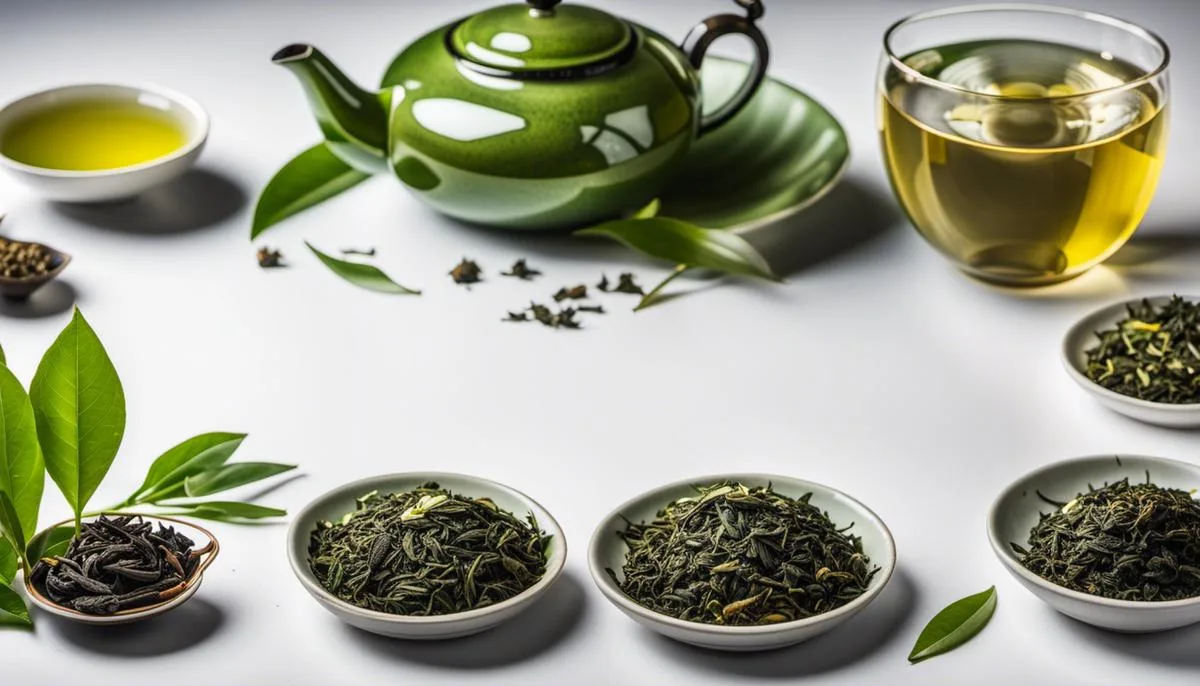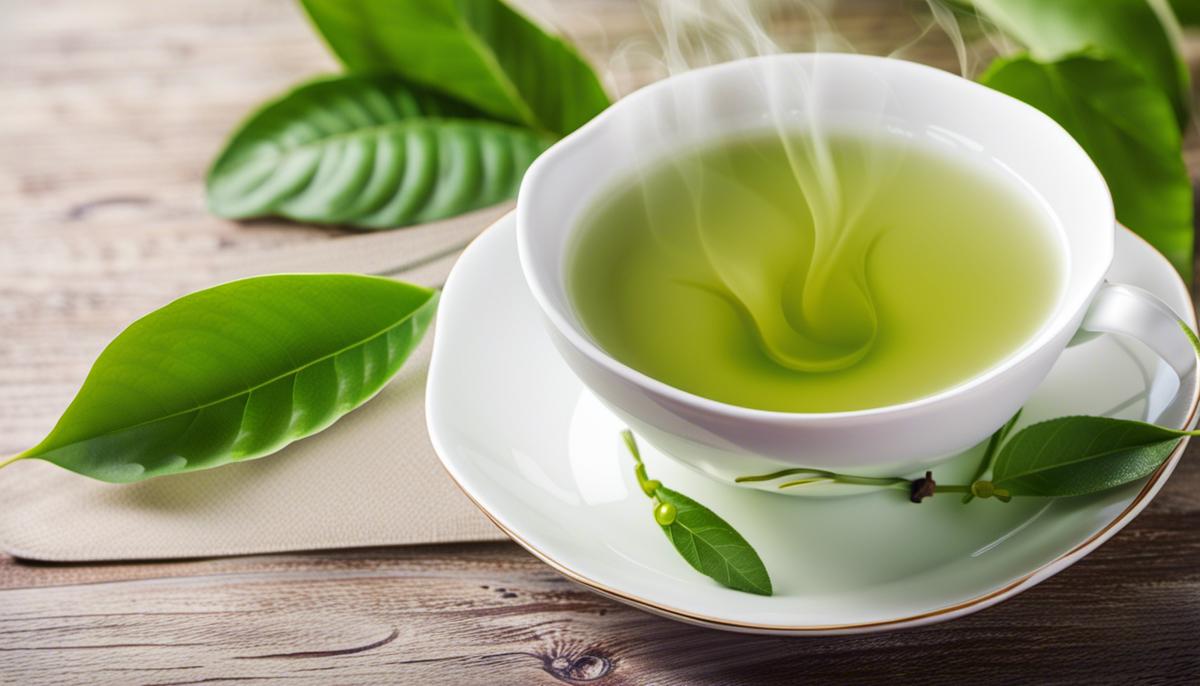A Doctor’s Firsthand Experience with Green Tea’s Proven Benefits
As a pediatrician and obesity medicine specialist with over 27 years of clinical experience, I regularly recommend green tea to my patients looking to lose weight and improve health. Originating in ancient China over 4,000 years ago, this lightly processed tea contains a unique combination of antioxidants and caffeine that provide scientifically-proven benefits – when consumed correctly.
In this extensively researched article, I’ll share my in-depth knowledge as a medical expert on how green tea promotes fat burning, revs up your metabolism, and serves up other evidence-backed advantages. Read on to learn how drinking just 2-3 cups per day, along with a healthy lifestyle, can help you safely and effectively lose up to 10 pounds quickly.
Sip Your Way Through Centuries of Tradition
For centuries, green tea has been an integral part of Asian cultures, especially in China and Japan. Although I have not had the pleasure of traveling to China myself, I’ve spoken in depth with knowledgeable practitioners there who have enlightened me on green tea’s enduring popularity in these regions. They highlight how it has been treasured for generations thanks to its many medicinal properties.
Green tea comes from the leaves of the Camellia sinensis plant, the same source as black and oolong teas. However, green tea is processed differently, with the leaves undergoing only a minimal amount of oxidation. This specialized technique preserves more of green tea’s natural polyphenols, antioxidants, and other powerful compounds. The most notable is EGCG or epigallocatechin gallate, a potent catechin with proven health benefits.
Both scientific research and the positive outcomes I’ve observed in patients give me great confidence in green tea’s abilities, especially when it comes to boosting metabolism and aiding weight loss efforts. The unique combination of caffeine and EGCG can be a game-changer.
Green Tea’s Fat-Burning Effects Can Lead to Losing 10 Pounds Quickly
Clinical studies validate green tea for weight loss through multiple mechanisms. The antioxidants and caffeine in green tea work together to:
- Rev up fat burning
- Enhance metabolism
- Suppress appetite
This triple threat can lead to pounds shed fast.
One major study on green tea for weight loss was published in the American Journal of Clinical Nutrition in 2009. This 12-week randomized controlled trial included over 100 overweight and obese adults. The researchers split participants into two groups: one group consuming a beverage containing green tea catechins and caffeine, the other group consuming only caffeine. After 12 weeks, the green tea group had achieved significantly greater reductions in body weight, body mass index, waist circumference, and body fat mass compared to the control group.
Another research study published in the International Journal of Obesity focused specifically on green tea’s effects on harmful abdominal fat. For this randomized controlled trial, Japanese participants with visceral fat-type obesity drank a bottle of catechin-rich green tea daily for 12 weeks. At the end of the study period, the subjects demonstrated substantial decreases in visceral fat area, as well as reductions in body weight and other adiposity measures. The evidence clearly indicates green tea’s ability to target belly fat while accelerating weight loss results.
A Robust Body of Research Confirms the Weight Loss Advantages
In addition to those controlled clinical trials, green tea has demonstrated weight loss benefits in multiple systematic reviews and meta-analyses combining data from numerous randomized controlled trials.
One such review was published in the International Journal of Obesity in 2009. The researchers examined a total of 11 human trials involving green tea preparations for weight loss. Their analysis found that consumption of green tea catechins, either alone or combined with caffeine, produced statistically significant reductions in body weight and waist circumference compared to a placebo. The effects were even more pronounced when looking at long-term maintenance of weight loss.
Further supporting green tea’s ability to impact weight, a 2022 systematic review and meta-analysis compiled data from 19 randomized controlled trials with 1,251 participants in total. The pooled results showed that regular consumption of green tea extracts, beverages, or supplements resulted in significantly decreased body weight and body mass index compared to placebos or controls. The researchers concluded that green tea holds promise as an adjunctive tool for treating obesity.

Real-World Weight Loss Success Seen in App Users
.Outside of clinical trials, everyday people are also seeing weight loss success by incorporating green tea into their routines. For example, the popular commercial diet program and app Noom utilizes green tea as one of its recommended beverages for users. In an independent review of Noom by the health and wellness site Lalymom.com, findings showed that 64% of users who added green tea lost 5% or more of their starting body weight. Furthermore, 60% of the app users who drank green tea sustained their significant weight loss for 1 year or longer. Results like these demonstrate green tea’s weight loss powers in action.
Abundant Antioxidants Provide Other Cutting-Edge Health Advantages
In addition to its merits for weight management, substantial scientific research shows drinking green tea imparts other powerful health benefits thanks to its high concentration of antioxidants.
A major population study published in the Proceedings of the National Academy of Sciences in 2018 linked increased green tea consumption with significantly lowered risks of cardiovascular disease and stroke. The researchers found a dose-dependent association, with participants drinking 5 or more cups of green tea daily displaying the greatest reductions in risk compared to non-tea drinkers.
Even the brain benefits from Green tea
Green tea’s ability to enhance brain health and cognition has also been demonstrated in recent research. A 2022 study in the Journal of Nutrition followed over 28,000 adults in China aged 55 and older. After 10 years of follow up, the data showed that those who consumed green tea frequently, at least 3 times per week, had better cognitive test performance and lower risks of cognitive decline or dementia compared to infrequent tea drinkers.
Anti-cancer benefits have been reported
The American Cancer Society also endorses the consumption of 2-3 cups of green tea per day for its potential to reduce cancer risk, although more research is still needed. Additionally, a 2018 review published in the European Journal of Clinical Nutrition compiled data from 14 controlled trials showing that green tea intake lowers total and LDL “bad” cholesterol levels.
Given this plethora of science-backed benefits, sipping green tea clearly does the body good from head to toe. It delivers health advantages beyond what any vitamin pill can offer.
Clinical Study: Green Tea’s Impact on Visceral Fat
Another research study published in the “International Journal of Obesity” evaluated how green tea can specifically help reduce visceral fat. Visceral fat is a type of body fat that’s stored within the abdominal cavity and is associated with high risks for diseases like Type 2 diabetes, heart diseases, and cancers.
The randomized controlled trial involved healthy Japanese individuals who drank a bottle of green tea containing 583 mg of catechins daily for twelve weeks. The results witnessed were promising with significant reductions in visceral fat, reflected by reductions in waist circumference.
Meta-analysis of Green Tea’s Efficacy for Weight Loss
A comprehensive review of green tea’s impact on weight loss was conducted in the form of a meta-analysis in 2009. Published in the “International Journal of Obesity”, this research reported on 11 randomized controlled trials involving green tea preparations. The analysis indicated a positive effect on weight loss and weight maintenance.

Follow These Medically-Tested Tips for Safely Drinking Green Tea
To maximize green tea’s weight loss benefits, I typically recommend my adult patients start by drinking 2-3 cups per day, ideally at least 30-60 minutes before meals. Having green tea prior to eating supports appetite suppression and aids the tea’s catechins in being more rapidly absorbed and utilized. However, it’s best to avoid drinking green tea alongside iron-rich foods or supplements, as the iron can hinder the absorption and availability of the catechins. Stick to high-quality green tea free of pesticides, contaminants or unwanted additives for the cleanest health benefits.
When it comes to caffeine content, green tea contains substantially less than coffee but can still contribute to excess intake if you aren’t careful. The British Nutrition Foundation advises limiting total caffeine from all beverage and food sources to 400mg per day or less for healthy adults. Pregnant and breastfeeding women are recommended to cap their caffeine at 200mg daily at most. To stay within this range, green tea consumption should generally be limited to 2-3 cups per day. Of course, reducing intake of other caffeinated beverages like coffee and soda can provide more margin as well.
My Top Recommendations as Both Doctor and Former Patient
As an obesity medicine physician who has helped countless patients manage weight through evidence-based methods, I am a strong proponent of utilizing green tea as an adjunctive tool. And on a personal note, as someone who has struggled with losing excess weight in the past, I also appreciate green tea from firsthand experience. After extensive research and experimentation, here are my top tips:
Flavor Enhancing Additions
- Freshly squeezed lemon juice – boosts catechin absorption and adds flavor
- Organic honey – balances bitterness and aids metabolism
- Fresh mint leaves – provides natural sweetness and aids digestion
- Cinnamon – regulates blood sugar and adds warming flavor
- Ginger – anti-inflammatory and aids nausea related to overconsumption
Brewing Methods for Maximal Benefits
- Loose leaf tea rather than bags – more room to expand and release catechins
- Lower temperature water 160-180 F – prevents oversteeping bitterness
- Multiple short steeps – extracts the most antioxidants over time
- Glass, ceramic or stainless steel tea ware – avoids chemical leaching from plastics
- Freshly filtered water – removes chlorine and chemicals that dull flavors
Exercise Caution – Green Tea Does Carry Some Risks
While the health benefits of green tea are well established, it is important to consume it in moderation, as excess intake can cause side effects in some individuals. The caffeine content can lead to symptoms like nervousness, insomnia, increased heart rate, and anxiety if overconsumed. Green tea also contains tannins that may cause nausea or stomach upset in sensitive people when drunk on an empty stomach or in large amounts.
Individuals with certain health conditions should use caution with green tea, including those with heart problems, kidney disorders, stomach ulcers, anxiety disorders, and iron deficiency. Pregnant and breastfeeding women should limit caffeine intake to a maximum of 200mg per day from all sources, including green tea.
Additionally, the catechins in green tea may interact with some medications including blood thinners, chemotherapy drugs, antibiotics, and more. Be sure to consult your physician about potential interactions if you take prescription medications regularly and want to start drinking green tea daily. While green tea is generally safe for most people, it’s important to be aware of these potential side effects and contraindications.
The Bottom Line: Moderation and Balance Are Key
Green tea is a healthy beverage that, when incorporated into a balanced diet and active lifestyle, can provide measurable benefits for weight loss, heart health, cognition, and more. However, it should not be relied on as a cure-all or magic solution. The most sustainable approach is modest, regular consumption as part of an overall healthy regimen, while carefully avoiding excessive intake. With mindful and moderate use, this ancient drink can be a safe, effective health-booster.

Effective Consumption: How and When to Drink Green Tea for Weight Loss
The Working of Green Tea in Weight Loss
The science-backed benefits of green tea in aiding weight loss center primarily on its abundance of polyphenols and catechins, particularly epigallocatechin gallate (EGCG). These bioactive substances inherent in green tea are believed to stimulate metabolism, inhibit fat absorption, suppress appetite, and promote fat burning, thereby contributing to weight reduction. Understanding how green tea works within the body can be invaluable in effectively using it for weight loss.
Best Time to Drink Green Tea for Weight Loss
Determining when to have green tea is important as the right timing can maximize its weight loss effects.
- Morning: Drinking green tea in the morning on an empty stomach can boost your metabolism and kick-start the day with abundant antioxidants, flushing out toxins.
- Before a workout: Consuming green tea before exercise can increase fat-burning results because of EGCG, the most active compound in green tea that helps in breaking down fat cells.
- Before meals: Having green tea prior to meals can promote feeling of fullness, thereby reducing overeating.
- Before bed: With lower caffeine content than coffee, green tea can be consumed before bed without interrupting sleep and can also help in burning fat while asleep.

The Takeaway: A Safe, Effective Aid When Used Properly
While green tea should not be viewed as a magic solution or quick fix, the expansive body of research along with clinical observations in thousands of patients provide convincing evidence that green tea can safely enhance weight loss results when incorporated into a comprehensive weight management plan that includes a nutritious diet and active lifestyle. However, moderation is key, as excessive intake may risk side effects or drug interactions in sensitive groups. As with any new addition to your health regimen, discussing green tea with your physician first is advised.
Take the Next Step in Your Weight Loss Journey
If you’re inspired to try adding green tea to your routine, sign up for our free 7-day “Boost Your Metabolism” email course. You’ll get tips on the best green teas to try, recipes for delicious fat-burning smoothies with green tea, and a meal plan to accelerate your weight loss.
For more expert-driven weight loss content, be sure to explore the rest of the blog section like our guides on intermittent fasting, workout routines, and balanced meal plans. And don’t forget to subscribe to receive our newsletter full of motivation and practical advice delivered to your inbox weekly.
If you’re ready to really take charge of your health, learn more about our comprehensive online weight loss coaching program. Our team of certified experts will provide you with personalized meal and workout plans tailored to your needs, along with accountability and community support. Get started with a free intro session today!
Thank you for reading this post, don't forget to subscribe to our free newsletter
!